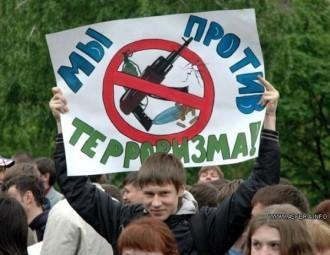Elena Tonkacheva: Anti-terrorist Concept doesn’t have any implementation parameters

Without cooperation with the civil society it will be difficult for the state to implement recently adopted Anti-terrorist Concept.
Such an opinion in the talk with the EuroBelarus Information Service shared Elena Tonkacheva, human rights activist and the head of the Legal Transformation Centre “Lawtrend”.
Anti-terrorist Concept was adopted by the Council of Ministers’ decision No. 658 after July 25 and put on the National Data Portal.
Elena Tonkacheva said that Legal Transformation Centre welcomes the adoption of this document and considers it to be an important step in treating terrorism by means of legal principles on the part of the state.
However, the expert also recalled that any concept should be supported by certain implementation parameters: “In this document I haven’t found the answers to the following questions: what will the success indicator be? In what way will monitoring and evaluation as well as concrete actions, necessary to implement the Concept, be carried out? Who is going to be responsible for that?” – wonders Elena Tonkacheva.
It’s not only about evaluation
The Concept has an interesting thesis, which says that the inner source of terroristic threat can be “relaxation of patriotism and traditional moral values among youths” for a variety of listed reasons. In this connection Elena Tonkacheva suggested to not only give evaluation of the Belarusan civil society development, but also pay attention to how Belarusan state resolves this situation.
“At post-Soviet area many states realize the role and the importance of the civil society and admit that strong civil society furthers the development of the country, overcoming inner barriers and tensions, integration of socially vulnerable groups. That is why such countries adopt the Concepts aimed at the strengthening of the civil society”, - recalled the expert.
Patronage of the untalented and weakening of the active
“In Belarus the situation is absolutely opposite. On the one hand, we have a number of public organizations under the state’s patronage, incapable to relieve social tension; on the other hand, we see the whole set of civil society actors, which have visible difficulties in their relationship and build-up of positive communication with the state bodies”, - admits Elena Tonkacheva.
The head of the Legal Transformation Centre emphasized that the fact that Belarusan authorities don’t show any willingness to cooperate with the part of civil society they cannot control is, perhaps, what weakens civil society. “And when stating the weakness of the civil society in the Concept, the state has to give realistic assessment about the steps it should take in order to provide good basic conditions for the citizens’ activity and the development of NGOs. I believe that here is where the potential to common development lies”.
We shouldn’t give immediate negative reaction
In order to implement the Concept successfully, we need to review the politics towards civil society, believes the head of the Lawtrend: “I stand for cooperation on condition that there is mutual understanding, respect and dialog between the state and the civil society”.
However, can it happen so that the adopted Concept will become an instrument of struggle against the civil society?
According to Elena Tonkacheva, it is difficult to give a well-grounded answer now. “Everything will depend on the application of the Concept, and only after some time passes – a year or two – we will be able to give a well-reasoned evaluation”, - assumes the expert.
-
03.01
-
07.10
-
22.09
-
17.08
-
12.08
-
30.09



























